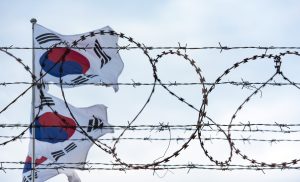“Two-thirds of South Korea’s strategic elites do not favor nuclearization of South Korea,” Victor Cha, a senior vice president for Asia and Korea Chair at the Center for Strategic and International Studies, said in his latest report published by Washington-based CSIS in April.
The report came out after South Korean domestic polls showed the opposite: that the majority of South Koreans – nearly three-quarters – support the idea of the country developing its own nuclear weapons as a means to deter North Korea’s preemptive nuclear strikes. Cha’s report might come as relief to U.S. elites, as Washington has opposed the idea of South Korea acquiring nuclear weapons for decades, since the end of the 1950-53 Korean War.
Since North Korea demonstrated its abilities to develop advanced nuclear weapons and to conduct nuclear tests, calls have been growing for the South Korean government to develop its own nuclear weapons. Especially in the wake of the collapse of the North Korea-U.S. nuclear talks and the inter-Korean dialogues, South Koreans increasingly support the idea of the country having nuclear weapons as a security guarantee.
Traditionally, Washington elites and policymakers have had deep-seated objections to this idea. However, one of the figures who may influence a future Trump administration’s policy on North Korea (if former President Donald Trump is re-elected in November) offered an iconoclastic perspective in an exclusive interview with South Korea’s Yonhap News Agency.
Elbridge A. Colby, former deputy assistant secretary of defense for strategy and force development, said it is unrealistic to expect North Korean leader Kim Jong Un to give up his nuclear weapons, meaning the denuclearization of the Korean Peninsula is an unrealistic goal.
It is not a comforting remark for those in Seoul who still believe that the denuclearization of the Korean Peninsula can happen, depending on the willingness of the U.S. to resolve the security conflicts on the peninsula.
Instead, Colby argued that U.S. policy on North Korea should be centered on arms control to limit the range of North Korea’s intercontinental ballistic missiles – which are believed to be able to target the mainland of the United States. That, too, will arouse concern in Seoul, as it would leave the North in possession of thousands of nuclear capable, shorter-range missiles that could decimate South Korea.
Colby also stressed the necessity of shifting the focus of the U.S. forces stationed in South Korea from North Korea to China.
In the interview, Colby clearly emphasized that he is not part of Trump’s campaign team so as to prevent readers from misreading his comments as the official stance of Trump on North Korea. Even so, his remarks should be noted.
The latest poll by the New York Times on May 13 showed Trump in the lead in five key battleground states: Pennsylvania, Arizona, Michigan, Georgia and Nevada. This means that Trump’s victory in the upcoming U.S. presidential election must be considered a serious possibility (even as he appears in trials as the first U.S. president to be prosecuted in history).
If Trump assumes the presidency again, dramatic changes in the United States’ policy on North Korea might follow, considering his latest remarks that Seoul should pay more for the presence of U.S. forces in South Korea.
For those who support the South developing nuclear weapons, such views from Trump and a former defense official in his administration will bolster the case that Seoul should pursue nuclear weapons for its own defense. However, the consequences of such a decision would be extreme.
To start, such an action will destabilize the Korean Peninsula even further, providing a justifiable excuse for Pyongyang to further boost its nuclear and missile development. Seoul would also face China’s reaction to its nuclear development, further increasing the pressure on South Korean security.
Also, if South Korea officially takes steps to develop indigenous nuclear weapons (rather than persuading the United States to redeploy its nuclear weapons on the South’s soil), it would damage the South Korea-U.S. alliance. Seoul would lose its status as one of the United States’ key allies in Asia. Not only that, but Seoul would be isolated from the larger international community. South Korea could expect to be sanctioned by the United States and the United Nations for its violation of the Non-Proliferation Treaty (NPT).
No matter how and when South Korea can actually produce nuclear weapons, merely making the attempt will cost Seoul its leverage and power in the international community. Its years-long demands for North Korea to give up its nuclear weapons to build a nuclear-free Korean Peninsula would no longer be compelling. South Korea losing its position as a middle-power country whose voice can influence international agendas through its growing soft power is a nightmare scenario.
For Seoul, the costs clearly outweigh the advantages of developing nuclear weapons. With a strengthed South Korea-U.S. alliance and a powerful conventional military, Seoul already has a strong deterrent toward North Korean nuclear attacks.
South Korea has the power to diplomatically resolve security conflicts with North Korea. Rather than pursuing the easiest path for its defense, Seoul should consistently work with neighboring countries to pressure North Korea to give up its nuclear weapons so that the Koreas can construct a permanent peace on the Korean Peninsula for future generations.
































